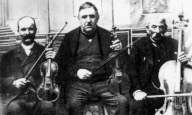


Violinist. Born blind in 1838, Augusto Migliavacca at the age of seven was directed towards the study of the violin, and he found in it a true source of life, perfectioning himself as far as reaching an exceptional virtuosity which gave him the worthy name of " The Paganini of the travelling musicians". His family definately didn't live in prosperous economical conditions and the mastering of this musical instrument soon led the violinist to work as a vagabond soloist.Seeing that he possessed a reasonably good singing voice, Miglavacca began to accompany the sound of the violin with his voice. When he was young he did a tour (if you can call it one) of various caffès of the Piemonte region and then for a long time was accompanied by a shrill guitar player, (and then later, for 15 years was accompanied by the violinist Giuseppe Ferrari and violincellist Bartolomeo Marchesi), going around roads, squares and courtyards in Parma playing his own music. His stop offs in front of the old caffè Marchesi, in the rooms of the Concordia and the Croce di Malta are still very remembered and he would also very often participate in festivals and markets of the provincial towns
No other musician had allowed so many encores in his life at such a low price, perhaps for two or three cents thrown onto the beggars plate. In front of the thick column of the "Piazza Grande", where the tyrant Anviti had been beheaded, killed by the fury of the people, Migliavacca played on a stormy day his tragic musical programme. One day when he broke his instrument, Pellegrino Molossi remedied the incident (who became of vital importance to the "street" violinist) by launching a public subscription on the pages of the 'Gazzetta di Parma'. Another time, half of the city ran into the square to see the historical challenge between the trio Migliavacca and the trio of a certain Zinzani: the winning musical group would have had the right to survive in the city; well, the parmesans were almost all in favour of Migliavacca and company.
A composer gifted with remarkable inspiration, he wrote and published an important march (Goodbye to the Ancona brigade), a 'mazurka' (Flora), a polka (The last days of Carneval), a gracious waltz (Light of my soul), another very much played waltz ( The nightingale) and like everyone knows he is the author of the famous 'Mazurka variata' which holds his name, which had been for a short while attributed to other composers. When Augusto Migliavacca died in 1901, a public subscription was arranged on the 'Gazzetta di Parma' in order to erect a bust, under the arches of the cemetery.